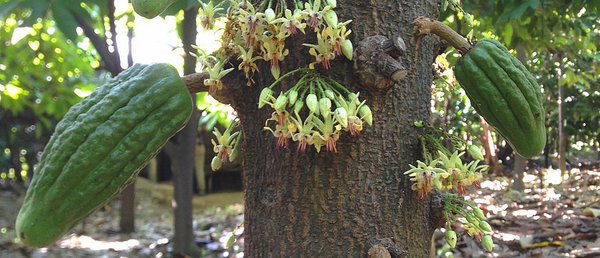 Read this article in French
Read this article in French- Share this article
- Subscribe to our newsletter
Optimised cocoa pollination for higher yields
Just how successful cocoa growing is depends largely on functioning pollination. For instance, if there is a lack of pollinators, this will result in lower yields – and hence to financial problems for the farmers. A survey in which JMU participated has now examined how yields and the quality of bio-cocoa can be enhanced – by more efficient plantation design which also considers ecological aspects.
In field surveys in Peru, the researchers identified pollination techniques improving pollination success and yielding better-quality fruits.
For this purpose, the team first of all compared self-pollination of the flowers with cross-pollination. In self-pollination, the stigma is pollinated with the plant’s own pollen, whereas in cross-pollination, the pollen comes from another plant’s flower. The result was that whereas self-pollination only led to little success, this value improved three- to eightfold with cross-pollinated plants.
Survey provides basis for better plantation planning
“Cocoa has a mechanism which appears to prevent self-pollination,” explains Dr Justine Vansynghel, a scientific assistant at JMU’s Department of Animal Ecology and Tropical Biology. Strong genetic difference, i.e. the lowest possible degree of relationship between the pollinator and the pollen recipient, is crucial to the success of pollination.
“In a very concrete manner, our research helps agriculture to optimise plantations for natural cross-pollination in future,” Vansynghel continues. “We can identify pollinator-recipient combinations which yield high-quality fruits and should therefore be planted closely together. This goes hand in hand with better use of the land and higher yields.”
In addition to the genetic make-up, the researchers were even able to establish further environmental factors which impact on pollination success, such as the temperature and the relative humidity of the air.
Commissioned by the Federal Ministry for Economic Cooperation and Development (BMZ), the research project was run by JMU in collaboration with the University of Göttingen, also in Germany, and Bioversity International.
(JMU/wi)





Add a comment
Be the First to Comment